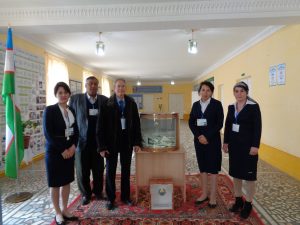Early presidential elections in Uzbekistan – December 2016
 In connection with the death of Islam Karimov, the people of Uzbekistan are called before an early (extraordinary) presidential elections for December 2016.
In connection with the death of Islam Karimov, the people of Uzbekistan are called before an early (extraordinary) presidential elections for December 2016.
In the time between, the joint session of the Legislative Chamber and Senate of the Oliy Majlis (parliament) of the Republic of Uzbekistan adopted a joint resolution on temporarily placing the exercise of the responsibilities and powers of President of the Republic of Uzbekistan on the Prime Minister of the Republic of Uzbekistan
Then, the Uzbek parliament chambers asked to the Central Electoral Commission of the Republic of Uzbekistan was recommended to arrange the conduct of elections of President of the Republic of Uzbekistan in complete conformity with the law “On Elections of President of the Republic of Uzbekistan”.
First of all, the legal processes for both the temporary nomination for the vacant presidency and the organization of new elections proves that the State of Uzbekistan is acting within the State of law, which was constantly consolidated since Uzbek independence. This is a proof, that the country is maintaining intact the course of maintaining stability of the country through an important and increasing set of laws and norms.
The system of organization of the presidential elections in Uzbekistan is also built on the basis of broad international experience in the elections since its politicians and administration have examined various international models, and adapted it to the specific needs of Uzbekistan
The Uzbek modernization is going very fast but the success of the Uzbek model is this rapid change find its source in its desire to keeping its roots strong and preserving its identity and traditions.
A democratic model is a mixture of international norms but also the influence of the national traditions, history and geography. Each country has the right to build its own democratic, economical and political model. The election process in Uzbekistan therefore reflects its specific model.
The Election of the President is important, as it is an indicator of the degree of democracy development and the implementation of international norms and specific principles in the country.
For these next 2016 elections, the Uzbek state implements new measures to further develop the legislative framework of the electoral system of the country, strengthen the independence and impartiality of the Central Electoral Committee in order to improve the holding of presidential elections in full compliance with the electoral law, international norms and standards
The new amendments in the Law on elections of the President of the Republic of Uzbekistan in the light of electoral standards of OSCE, are the results of the recommendations made by ODIHR mission on the results of elections of the President of the Republic of Uzbekistan of 2015. They promote more reinforcement of the principle of free elections, further democratization of the electoral system of the country, the provision of ensuring equal conditions for candidates to the President of the Republic of Uzbekistan, more precise rules concerning pre-election agitation, strengthening of the principles of openness and transparency of the presidential elections.
This proves also that the Uzbek model of democracy and the processes associated like electoral laws is in constant evolution and is improving with time, with a "step by step" approach, in order not to rush into democratic models completely imported from abroad and no suited to Uzbek specific requirements.
The whole electoral process and laws have to be considered in unity with economic, political and legal reforms being carried out in the country. By improving gradually its electoral process in synergy with the promotion of the "Uzbek model" of modernization, Uzbekistan maintains its "step by step " modernizing course and is eager to build at the sae time strong legitimacy of its model among citizens.
Uzbekistan constant modernizing course since its independence is a success model not be ignored when we sees the failure of many states in transition in the world in its geographical proximity.